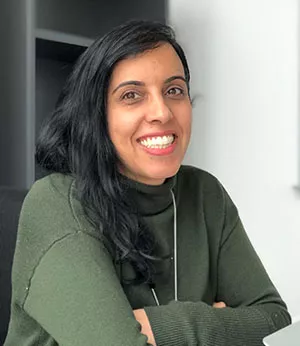
Technological tools for education & connection
Professor Negin Dahya set off on her academic path with technological tools in education as a focus, but it was an opportunity to participate as a research assistant at the Centre for Refugee Studies at York University that led to her current research path.
“I was doing my PhD, studying digital media in video and video gaming with young people in schools,” says Dahya, who joined U of T Mississauga’s Institute of Communication, Culture, Information, and Technology in 2019 as an assistant professor. “Then out of interest I worked on a project called The Borderless Higher Education for Refugees.”
This first-of-its-kind degree program offers university education through on-line and in-person classes to refugees in Kenya’s Dadaab refugee camp. The program is offered through a partnership between York University and other universities in Canada and Kenya.
Since obtaining her PhD at York in 2014, Dahya continues to focus on education. She considers the cultural and social contexts of digital-media production and its use through the lens of learning, and with a particular focus on women in refugee camps in Kenya, working specifically in Dadaab and Kakuma refugee camps. Some of the interesting findings she has come across include how social networks, access to education and information sharing are all enhancing teaching and learning environments to support girls and women, and how they are further strengthened by having male advocates and supporters in the camps and communities.
Listen to a full interview with Professor Dahya on VIEW to the U from March 2020
“We found that social media networks are really crucial spaces through which people stayed connected but also shared important information, and the importance of this resource sharing and peer-to-peer networks for women who are in the camps became quite apparent as well,” she says, adding that men have a significant role to play.
“Though other women, who were role models and who had left the camps were certainly important parts of their world, but also the men that were involved as allies and who were supportive in sharing information, encouraging continued learning and pursuing higher education were also key contributors.”
Dahya has ongoing collaborations with research partners Professors Sarah Dryden-Peterson at Harvard Graduate School of Education and Olivier Arvisais at Université du Québec à Montréal with research based in refugee camps. Other projects Dahya is involved in include the study of virtual reality concept-art creation with young people in a juvenile rehabilitation centre that is funded by the Institute for Museum and Library Service in Washington, D.C., and also an examination of the technology access and education opportunities for refugee women that takes into account the role public libraries and non-profit government programs play in the provision of services in Seattle, WA.
With a research agenda that has females at the fore and with International Women’s Day recently commemorated on March 8, Dahya says that while it is important to participate in the kinds of dialogue and events that take place to commemorate the day, she encourages others to always champion equality.
“People should recognize that feminism is not a bad word, and to name patriarchy where patriarchy stands, because I think we skirt away from that language as we do with racism and classicism, and ableism, and homophobia and transphobia,” says Dahya.
“I think taking ownership of that language, naming things as they are, and that many of us at different intersections and axes of these problems face discrimination. International Women’s Day can be a good moment to see how many people are affected, but also to remind each other that we are all in it together and we should try to keep the momentum going past the day.”
